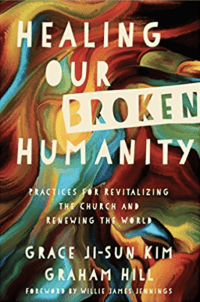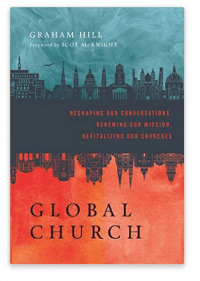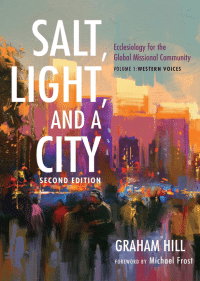Recovering the spiritual practices of resistance, nonconformity, and transformation

“This hour in history needs a dedicated circle of transformed nonconformists. Our planet teeters on the brink of atomic annihilation; dangerous passions of pride, hatred, and selfishness are enthroned in our lives; truth lies prostrate on the rugged hills of nameless calvaries; and people do reverence before false gods of nationalism and materialism. The saving of our world from pending doom will come, not through the complacent adjustment of the conforming majority, but through the creative maladjustment of a nonconforming minority.” ~ Dr. Martin Luther King, Jr.
The powers in this world (and all too often in our religious institutions) want you to conform, to be docile and passive. Don’t rock the boat. Don’t cause trouble. Don’t speak up. Be silent. Conform. But resistance and “transformed nonconformists” are urgently needed in the church and the world today. Resistance, nonconformity, and transformation are Christian spiritual practices.
Thousands of Australian school students took to the streets this week, protesting the Australian Governments inaction on climate change and shameful history of environmental degradation. Frustrated by their Government’s disinterest in genuinely tackling the causes of climate change—and concerned that it will be their generation that will suffer the consequences of the human-made global warming and environmental destruction that is happening before their very eyes—these school students embraced the spirit of protest and resistance and walked out of their classrooms in their thousands, demanding action by the Australian Government.[1]
“Strike 4 Climate Action” saw children protesting on the streets of Sydney, Melbourne, Perth, Hobart, and other Australian cities, bring traffic to a standstill, and infuriating many conservative politicians. The Australian Prime Minister, Scott Morrison, urged the students not to take such action and told them to be “less activist.” What was the response from Australian children? 14-year-old Jean Hinchliffe said, “This is our first strike, our first action. And it is just the beginning. And we’ll keep doing it until something is done.” Freya and Bee, who are 13 and 14, responded with, “Because we don’t have a vote in the elections, it sometimes feels like you’re silent. You can influence something. Now it actually feels like [we are] making a difference about something we believe in. [We] think they are misjudging who we are. They are underestimating us. You can look around and see how many people are here.”[2]
The activism of these students evokes images of previous generations, who refused to be silent in the face of war, racism, gender inequalities, and more. Personally, I’m proud of these students and hope it is a sign of things to come. We need a generation of Australians who are engaged in politics, activism, and public life. There is transforming power in resistance and nonconformity.
This same week I joined with hundreds of Christians in Australia’s capital city, Canberra, to meet with and lobby politicians on issues to do with global poverty. The event was Micah Australia’s Voices for Justice, which brings the tribes of the Australian church together, to speak up for the world’s poor in our nation’s capital.
This week’s events got me thinking about the intersection between faith and politics, and about Dr. Martin Luther King Jr.’s words, “This hour in history needs a dedicated circle of transformed nonconformists.“
Many Christians feel concerned about corruption, political inaction, social inequalities, and systemic and structural injustices, but are silent. Why? Why be silent about the things the prophets and the Messiah spoke up about? There are many reasons, but one of them is that we have been handed a passive and docile spirituality by many of our Christians leaders and institutions.
Now, more than ever, we need a Christian spirituality of resistance, nonconformity, and transformation.
We need a spirituality of resistance
Today I listened to Dr Deidre Palmer presenting a confronting and inspiring message on the need to be churches that reveal God’s justice, compassion, and hospitality. In that message, Deidre referred to the work of Dr Nymabura Njoroge from Kenya (who now serves with the World Council of Churches). Having served Jesus among the poorest people in the world—and in countries plagued by gender and ethnic violence, political and corporate corruption, AIDS and malnutrition, and conflict and war—Nymabura calls the church to pursue an ethic of resistance and transformation.
We resist the principalities and powers that sustain injustice and poverty, that dehumanise us and lead us into conflict, and that exploit people and the earth. We resist all the forces that work against human and environmental flourishing, peace, and love.
A spirituality of resistance refuses to be silent about the evils and injustices that threaten our world and that oppose the kingdom of God. We resist all those forces that cause, protect, and sustain gender violence in church and society, the sexual abuse of children, the destruction of the earth, extreme poverty, child mortality, global warming, and the displacement and slavery of millions of people worldwide.
The world urgently needs people who speak up about injustice and suffering, and who choose to resist. 5.4 million children die each year before their fifth birthday. 815 million people go to sleep hungry. 60% of the world do not have access to safe and adequate sanitation. An unprecedented 68.5 million people are displaced, with millions seeking asylum. 40 million people are trapped in modern slavery. 35% of women worldwide have experienced physical and/or sexual violence. Climate changes are profoundly impacting societies and ecosystems. Church and state institutions and leaders have allowed many thousands of children to be sexually abused worldwide, all the while covering this up through secrecy, silence, and shame.[3]
Resistance is a spiritual practice. We see racism, greed, sexism, corruption, division, and hatred, and we the hear the Holy Spirit calling us to resist. In times such as these, we need to help Christians recover the spiritual practice of holy resistance.
A spirituality of resistance says, “No more! We will not be passive and docile. We will not be silent. We will resist for the sake of justice, human dignity and flourishing, and the vision of the kingdom of God given to us by Jesus Christ. We resist all forces that oppress, dehumanize, exploit, abuse, corrupt, and deceive. We seek to live lives of compassion, peace, justice, righteousness, and hospitality. And we call for change and action.” Nyambura puts it this way:[4]
A spirituality of resistance and transformation demands that we share the good news of the possibility of new life in the presence of death here and now. It is a spirituality that invokes a passion that believes positive change is possible… As we watch the escalating anarchy in many countries and in our streets, it is difficult to comprehend how we can end violent death and proclaim new life in Christ.
We even wonder where God is when such chaos and destruction take place. We therefore need a zeal that believes… that we can sit down together and engage in dialogue over our difference. Passionate commitment is needed whereby we are not afraid to try new ways of relating to our neighbours and our enemies. Such zeal would be willing to listen to the word of God in the scriptures that require that we trust in God and act justly.
How do we resist? Listen and learn from Christian leaders and movements that have practices holy and righteous forms of resistance. Peacefully protest. Attend marches and demonstrations. Lobby politicians. Give generously and seek to be content with what you have. Stop striving for more. Write to business leaders and politicians. Speak out on injustices. Slow down and resist busyness and ambition. Write op-eds for papers. Join with activist groups that are seeking change. Resist by modelling a different way—the way of truth, justice, peace, hospitality, compassion, and integrity. Volunteer among civic, political, social, and religious groups seeking to bring change. Get informed about politics and public issues, and about the intersections between faith and politics. Stand in solidarity with those who are taking a stand, and possibly paying a heavy price. Meet with other Christians and pray and brainstorm about what you need to resist and how you will resist it. See resistance as a spiritual practice.[5]
We need a spirituality of nonconformity
In 1954 Martin Luther King Jr. preached a powerful sermon calling Christians to become “transformed nonconformists.”
King observes, “I have seen many white people who sincerely oppose segregation and [discrimination], but they never took a [real] stand against it because of fear of standing alone.”[6] But, Scripture commands us, “Be not conformed to this world: but be transformed by the renewing of your mind.” (Romans 12:2). King goes on to lament that many Christians express the same bigotries, rugged individualism, racism, sexism, ambitions, and fear as the rest of society. What is the answer? We need “transformed nonconformists.”
Now let us make it clear that non-conformity in itself might not be good. There is a type of bad nonconformity. There is no virtue in being a nonconformist just to be a nonconformist. Some people are nonconformist just to get attention and to be different. So, Paul gives us a formula for constructive nonconformity which is found in the second half of the text. In order to discern the true will of God and become constructive nonconformist we must accept a new mental outlook. We must be transformed. Jesus’ phrase for this experience was the new birth. And so only when we have been born again can we be true nonconformist. We are called upon to be transformed nonconformist. This is our eternal challenge as Christians.
Transformed nonconformity is a spiritual practice. In Mobilizing Hope, Adam Russell Taylor of Sojourners says the church needs to find ways “to inspire and mobilize a committed minority of transformed nonconformists who creatively apply their faith in fresh, bold, and innovative ways.”[7]
What kinds of things do we need to resist and refuse to be conformed to? There are many “spirits” in the world today, which seek to conform us to their ways and into their image. These include fear, distrust, and hatred of strangers (including minorities, asylum seekers, and those of a different religion). Frenetic activity and compulsive busyness. Racial and sexual prejudice and discrimination. Narcissism and ego-driven competitiveness. The accumulation of goods. Building our personal “brand.” Narrow patriotism and aggressive nationalism. Rugged individualism. Naïve post-racialism. Blind faith in markets. Disinterest in the wellbeing of the weak and vulnerable. Rootless morality and ethics; set adrift from the ethics of the kingdom of God.
How do we practice our nonconformity? By rejecting the things I’ve just mentioned, and by choosing to live into the vision and ethics of the Sermon on the Mount. The Sermon on the Mount provides a lifegiving alternative to the conforming forces I’ve talked about, by calling us to lives of peacemaking, love for our enemies, compassion and forgiveness, welcoming the stranger, contentment and generosity, humility and prayer, and justice and righteousness.
The Sermon of the Mount reminds us that God’s presence is among the vulnerable, broken, and weak—among the asylum seekers, AIDS sufferers, sexually “other”, homeless, poor, unemployed, and those who are different from us religiously, racially, sexually, politically and so on. The Sermon on the Mount reminds us that we are now citizens of a kingdom that values justice, peace, hospitality, and compassion.
The Sermon on the Mount offers a profound insight into Jesus’s social ethic, and his vision for discipleship and his people’s life together. It’s a blueprint for a community of transformed nonconformists.
In Matthew 5:1–2, Jesus is surrounded by huge crowds. He climbs a beautiful hillside overlooking a large freshwater lake and delivers the longest speech recorded in the gospels. In this beautiful setting with exquisite views of the lake, Jesus delivers an astonishing vision of a new people, who embrace a radical, world-transforming way of life in the world.
This speech is a stunning description of Jesus’s vision for life, discipleship, ethics, prayer, reconciliation, hospitality, justice, and community. It includes the Beatitudes and the Lord’s Prayer, and it leaves his audience (ancient and modern) shocked and uneasy. Jesus calls his church to embrace a new, radical, ethical, and alternative way of life together in the world. This isn’t just a picture of the individual righteous life. This is a social ethic. This is a vision of a community of disciples who pursue lives together and in the world, that witness to him, to a new humanity, and to the age to come.
Philip Yancey says that in the Sermon on the Mount we see absolute ideals and absolute grace. This isn’t another form of legalism, but a vision of a righteous people, utterly reliant on, and empowered by, God’s grace. This is a vision of a people who mirror, in their life together, the nature of God. Jesus calls his people to pursue God’s ethics and morality with great enthusiasm and dedication, but to realize that they are only able to achieve any righteousness through grace.
So, what kind of life does Jesus call us to embrace and how do we live as “transformed nonconformists”? The Sermon on the Mount shows us what kind of people Jesus calls and invites us to be—people who are not conformed to this world but renewed in our mind and in our lives together and in the world. Transformed nonconformity is a spiritual practice because it is a choice to live out the ethics of the kingdom of God and not to be conformed to the patterns of this world.
The world (and often our religious leaders) say, “Be conformed to our politics, racism, sexism, division, fear, nationalism, greed, and individualism. Conform to our petty politics, self ambitions, mean spirit, fear and divisiveness, and clutching at power, position, and control.” We choose to say “No, we will resist, and will will not be conformed. We choose peace, justice, compassion, truth, mercy, and hospitality. We choose humility and selflessness, weakness and vulnerability, love and forgiveness, embrace and hospitality, and the way of the Cross. We choose to be disciples of Jesus, and to be transfomed by the renewal of our minds and lives.”
At the end of his sermon, King presents us with this challenge:
Who will take the attitude of Jesus and be a sincere nonconformist? Today we stand on the brink of moral and physical destruction and the great need of the hour is sincere nonconformist. [People] who will stand amid a world of materialism and treat all [others] as brothers [and sisters]; [those] who will stand up in a world that attempts to solve its problems by war and declare that [those] who live by the sword will die by the sword.
Who this afternoon will go away with the determination not to be a slave to the crowd and not to bow to the desires of the mob? Remember Christian friends, we are now in the colony of time, but our ultimate allegiance is to the empire of eternity. ‘Be not conformed to this world, but be ye transformed by the renewing of your mind.’
Sometimes our churches and secular and religious leaders give us the impression that we should submit and conform, and that this is our spiritual duty. Mutual submission and caring for the good of the whole community is, indeed, a spiritual act of service. But it must never be demanded of us through coercion and manipulation. It’s a choice we must be able to freely make; in an community that values mutual submission, genuine integrity, and respect for everyone’s dignity and freedom. Jesus Christ does not call us to be passive, conformist, and docile.
Resistance and nonconformity is a spiritual practice, which, to use the words of David Bosch, can alert everyone everywhere to the universal rule and reign of God in Jesus Christ.
We need a spirituality of transformation
Resistance and noncomformity need faith and hope. Otherwise, they can turn sour and bitter and self-serving.
All activism needs hope—the hope of transformed lives and communities that Jesus offers. In Mobilizing Hope, Adam Taylor says,
Activism without hope is like a balloon drained of air; it quickly deflates and loses its ability to rise in the air. Hope is the oxygen that inspires and sustains activism. Too often campaigns fail because of a deficit of hope. Too much spite, anger, or malice suffocates the hope out of activism. Hope animates our vision of what’s possible and guides what we are striving to achieve in the context of transformed nonconformism. Fortunately, hope is at the very heart of faith.
Our resistance and nonconformity must be complemented by our experience of (and hope for) transformed lives, transformed relationships, and transformed societies. It’s our transformed resistance and transformed nonconformity that testifies to a just, holy, and loving God. God calls us to live transformed lives that transform the world.
We are justified to live justly.
We are made righteous to live righteously.
We are transformed to transform the world, in the power of the Spirit of Jesus Christ, through faith, hope, and love.
Transformation happens when we submit ourselves to God’s powerful and gracious work, and when we pursue spiritual practices. In our book Healing Our Broken Humanity, Grace Ji-Sun Kim and I say that transformed churches pursue nine practices. These include renewing lament, repenting together, relinquishing power, restoring justice, reactivating hospitality, reconciling relationships, and restoring Christ-honoring mission and community. These practices revitalize the church and renew the world.
In our final Benediction, at the end of our book, Grace and I say that the good news is that you don’t need to do these practices in your own strength. The Spirit will give you what you need to engage these practices fully. Thanks to the power of Jesus working within you, you can live differently, practice these practices, and transform a dehumanized world. Be encouraged! You can make a difference! You’ve chosen to follow Jesus, to resist the powers and principalities, and to be a “transformed nonconformist.” You’ve opened your heart, mind, and life to what God wants to do in and through you. Now, by God’s grace and power, you can go and live this out.
“Here’s our prayer for you: May the God of creation expand your heart and mind as you reimagine the church as the new humanity in Christ. May God give you endurance and encouragement as you seek to change your world, to live in harmony with one another, and with one voice glorify God (Rom 15:5–6).
May the God of hope fill you with all joy and peace in believing, so that by the power of the Holy Spirit you may abound in hope (Rom 15:13). May the Spirit of courage help you lament the past together, the willingness to repent of white cultural captivity, and the determination to confront racial and gender injustice. We pray that the Spirit would give you the strength you need to give up your privilege, self-interests, and power, and to strive to restore justice to those who have been denied justice. God will enable you to be steadfast, immovable, always abounding in the work of the Lord, knowing that in the Lord your labor is not in vain (1 Cor 15:58).
May the God of peace and love be with you as you reinforce other’s agency, practice hospitality, seek restoration, pursue reconciliation, and live in peace (2 Cor 13:11). We pray that God will fill you with passion to recover life together—as a new creation and a redeemed community. May Christ dwell in your hearts through faith, rooting and grounding you in love, so that you will know the breadth and length and height and depth of this love, and be filled with all the fullness of God (Eph 3:17–19).
Be encouraged as you seek to live differently! You can live an extraordinary, Spirit-empowered life that changes the world. You can join with God in resistance, nonconformity, and transforming a dehumanized and broken world. You can indeed make a difference, and bear fruit that will last! “Now to him who is able to do far more abundantly than all that we ask or think, according to the power at work within us, to him be glory in the church and in Christ Jesus throughout all generations, forever and ever. Amen.” (Eph 3:20–21).”[8]
Graham Hill
Graham Hill (PhD) teaches pastoral studies and applied theology at Morling College in Sydney, Australia. He is the Founding Director of The GlobalChurch Project – www.theglobalchurchproject.com. Graham has written 6 books. His latest three books are “GlobalChurch: Reshaping Our Conversations, Renewing Our Mission, Revitalizing Our Churches” (InterVarsity Press, 2016), “Salt, Light, and a City, Second Edition: Ecclesiology for the Global Missional Community: Volume 1, Western Voices” (Cascade, 2017), and a co-authored book with Grace Ji-Sun Kim called “Healing Our Broken Humanity: Practices for Revitalizing the Church and Renewing the World” (InterVarsity Press, 2018)
© 2016 All rights reserved. Copying and republishing this article on other Web sites, or in any other place, without written permission is prohibited.
[1]Billi Fitzsimons. “All the Best Signs from the School Climate Change Protests Happening Across Australia.” MamaMia. 30 Nov 2018. Accessed at: https://www.mamamia.com.au/school-climate-strike-australia/
[2]Naaman Zhou. “Climate Change Strike: Thousands of Scholl Students Protest Across Australia.” The Guardian. 30 Nov 2018. Accessed at: https://www.theguardian.com/environment/2018/nov/30/climate-change-strike-thousands-of-students-to-join-national-protest.
[3]Statistics from (1) Micah Australia, “Beating Extreme Poverty Together” (2) UN Women, “Facts and Figures: Ending Violence Against Women”, (3) Australian Academy of Science, “What are the Impacts of Climate Change?”, and (4) The Conversation, “The National Apology to Victims of Institutional Child Sexual Abuse Matters. Here’s Why.”
[4]Nyambura J. Njoroge. Kiama Kia Ngo: An African Christian Feminist Ethic of Resistance and Transformation. Legion Theological Studies Series, Ghana. 2000. Quoted by Deidre Palmer in “Weaving Wisdom and Wonder.” Accessed at: https://assembly.uca.org.au/news/messages/item/2883-weaving-wisdom-and-wonder
[5]See Mark Sandlin’s excellent piece, “Following Jesus in the Age of Trump: Resistance as a Spiritual Practice.” Accessed at: https://www.patheos.com/blogs/thegodarticle/2017/01/following-jesus-age-trump-resistance-spiritual-practice/
[6]See the transcript of Martin Luther King Jr.’s sermon at https://kinginstitute.stanford.edu/king-papers/documents/transformed-nonconformist
[7]Adam Russell Taylor, Mobilizing Hope: Faith-Inspired Activism for a Post-Civil Rights Generation. 17.
[8]Grace Ji-Sun Kim and Graham Hill. Healing Our Broken Humanity: Practices for Revitalizing the Church and Renewing the World. InterVarsity Press, 2018. From the final Prayer and Benediction. Available here: https://www.amazon.com/Healing-Our-Broken-Humanity-Revitalizing/dp/0830845410
Want to be mentored?
Want to be mentored into a slower, deeper, and fuller discipleship, ministry, and life?
Books
Don’t forget to buy Graham Hill’s books:
- Healing Our Broken Humanity
- Global Church
- Salt, Light, and a City (second edition)



CONNECT WITH US
FOLLOW US ON SOCIAL NETWORKS






0 Comments